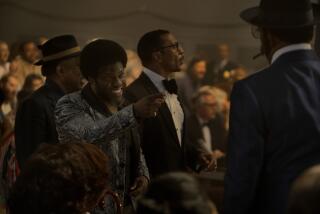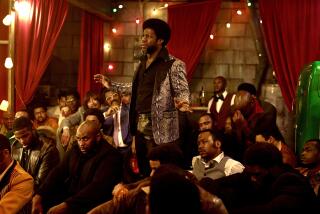Missed Chances Spoil the Success of ‘Kings’
- Share via
At the time “When We Were Kings,” the new documentary on the 1974 Muhammad Ali-George Foreman heavyweight championship fight, had a brief Oscar-qualifying run here last October, Times film critic Kenneth Turan gave it a positive review, saying it “always compels our interest.”
The film is now playing in movie theaters in Los Angeles and around the country, garnering an Oscar nomination and other critical acclaim as well as strong box-office response (“Best Documentary Nominee ‘Kings’ to Open Today,” Calendar, Feb. 14).
As a filmmaker myself and head of the documentary program at USC’s School of Cinema-Television, I am only too aware of the difficulty documentary filmmakers have in funding, producing and distributing their work. Leonard Gast has shown the requisite persistence that nonfiction filmmakers need. Nor is “When We Were Kings” undeserving of praise. It has power and efficacy, and Ali is a pleasure to watch. His story is not only fascinating and fun, it is important and revealing sociologically and historically.
Nevertheless, I was saddened and frustrated as I watched the film to see the missed opportunities that significantly mar the film’s success. In class, we teach that students need to look for linkages that make film material not just personal and compelling but offer a broader context for viewing the world.
This topic had tremendous potential to make those broader connections for the audience. The fight took place in the Central African country of Zaire--it was the famed “Rumble in the Jungle.” Unfortunately, the film’s view of Zaire never transcends that stereotyped cliche. The country is an exotic backdrop, run by a bloody dictator and filled with generic, voiceless dancing boys, women carrying babies on their backs and adoring Ali fans.
Nowhere do we learn that Mobutu Sese Seko is not just a terrible ruler but was actually put in place by our own CIA. Nor does the film, when it brings the Ali-Foreman story up to the present, mention that Mobutu is still in power, propped up for decades by America, corruptly ruling over the looting of his own country and a terrible civil war engendered in large part by his despotic leadership.
This, the worst of American imperialism, is just winked at in the picture, as though Mobutu were a colorfully aberrant personality with no connection to a larger political context.
Equally distressing is the out-of-context concert footage of Miriam Makeba, one of the strongest and most passionate of
the voices for freedom and dignity in Africa, used here solely to make her the symbolic representation of a succubus, a demon in female form who seduces Foreman and drains his strength and masculinity. It is truly dismaying that the filmmakers would use the “mother” of South African music for such insulting and demeaning ends.
Ali himself suggests wonderful and meaningful connections between America, African Americans and Africa, but the film ignores his insights, choosing instead the same old tourist view of poor Africa, romanticized with happy natives who are mere pawns in a Western entrepreneurial enterprise.
“When We Were Kings” shows Ali in his prime, a heroic figure with an electrifying personality, a courageous heart, an eager unconventional mind and powerful dreams that included educating African Americans about the true nature of Africa and their own African heritage. It is unfortunate that the film is not the full tribute to him it should have been.
More to Read
Only good movies
Get the Indie Focus newsletter, Mark Olsen's weekly guide to the world of cinema.
You may occasionally receive promotional content from the Los Angeles Times.










